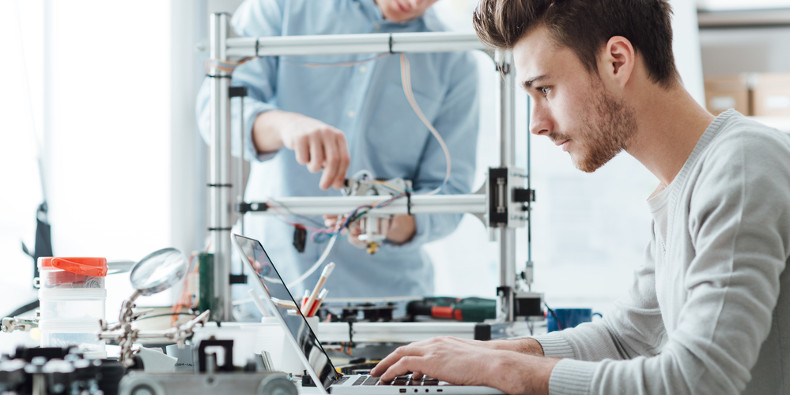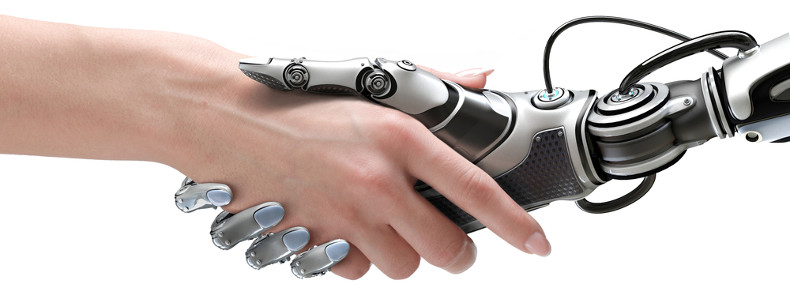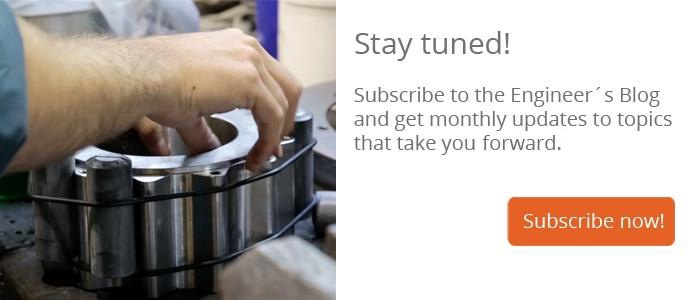Market Talk 1/19 - Changes at Universities, how Robots Create Jobs, Bugatti Brake Caliper from 3D Print, and why it is Worthwhile to Visit the Hannover Fair 2019

Typically, engineers focus on the smallest of details. From time to time, however, it is worth taking a look at the big picture – or even beyond it. What are the concerns of the market? What is being talked about and above all: where does the journey lead to? Here is our overview.
VDMA Study: Which skills do tomorrow’s engineers need to have?
Industry is undergoing substantial changes and the working environment is getting more complex. Industry 4.0 automation, networking and digital transformation are only some of the catchwords which not only necessitate a change of mindset in affected companies, but also in universities and training centers. The question of what is required for this has been addressed by the VDMA (German Engineering Federation) in the recently published IMPULS Study “Ingenieurinnen und Ingenieure für Industrie 4.0“. (Engineers for Industry 4.0). For the first time, a ‘target profile engineers 4.0’ has been compared with the current situation – including recommended procedures and course of action.
Just to mention a few results: The integration of new technical content often proves to be quite difficult. A stronger interdisciplinary cross-interlocking between the fields of mechanical engineering, electrical engineering and computer science is urgently needed. Apart from methodical know-how like process and system thinking, inter-disciplinary competences such as team work skills, independence, as well as, ability to learn and adaptability are getting more and more important.
The study mentioned above has been prepared by the Institut für Sozialwissenschaftliche Forschung e. V. – ISF (Institute for Social Science Research), Munich, on behalf of the IMPULS foundation of the VDMA. In addition, a special "online competence check industry 4.0" has been developed on the basis of this study. Check it out and see whether you are ready for Industry 4.0.
On the website of the VDMA you find more details, the study and a link to the online tool.

More robots, more jobs
The German Government intends to invest more than three billion Euros to research the potential of artificial intelligence (AI) before the year 2025. In addition, a national research network, 100 new professorships and more venture capital are being debated. Why? Because the new strategy “AI made in Germany” shall make Germany the world market leader in terms of the smart factory concept.
But never fear: Progressing digitization will not necessarily destroy jobs, but will create jobs. At least, this was the assertion by Heinrich Munz, Digital Chief Strategist of KUKA, during the FORCAM Innovation Day. The Augsburg based company KUKA, a world-leader in robotics and automation solutions that is majority owned by the Chinese group Midea, has long been dealing with the questions: What does Industry 4.0 mean and what are its effects on society and the job market of the future?
You can find the replies in the blog of the machine builder under “Snapshot 4.0“.
Bugatti Super Sport brakes with titanium calipers made by 3D printer
Bugatti is a synonym for wickedly expensive super sports cars, and titanium stands for a material with an extremely high tensile strength which is predominantly used in aerospace engineering. Up to now: in cooperation with the 'Institut für additive Produktionstechnologie' (Institute for additive Production Technology, formerly Laser Zentrum Nord) in Hamburg, the developers of Bugatti manufactured a titanium brake caliper by using a 3D printer. This caliper which accommodates the brake pistons including the brake pads and encloses the brake disk must withstand extreme loads and decelerate the car within a few seconds.
It is exactly the advantage of the high tensile strength that makes it so difficult to precisely mill or forge such a component from a titanium block as is commonly done with aluminum blocks. A high-power laser featuring a novel production method of the 'Institut für additive Produktionstechnologie' solved the problem – this machine for selective laser melting disposes of 4 lasers with a capacity of 400 Watt each. It needs a full 45 hours for one single brake caliper.
The process description and other exciting details about this innovative lighthouse project are presented on the website of Bugatti.

Outlook: HANNOVER FAIR 2019
The HANNOVER FAIR, which takes place from April 1 to 5, 2019, is quickly approaching. As in past years, this fair will again promote digital transformation of the industry and energy sectors, and year after year, it takes a big step forward into the future – in 2019 the lead theme is “Integrated Industry – Industrial Intelligence”. The meaning behind this is nothing less than digital networking between the human and the machine in the area of artificial intelligence.
In this sense the lead theme of the HANNOVER FAIR 2019 emphasizes the increasing importance of artificial intelligence and machine learning. Topics like efficient energy utilization, autonomous production processes as well as the challenges in terms of interfaces, protocols and security will be discussed.
RINGFEDER will be among international thought leaders from the fields of artificial intelligence, manufacture, production and industry when they come together to mutually discuss and develop solutions for the future. Visit us in hall 25, stand D23, and experience the drive technology of the future at our spacious fair stand. We are looking forward to your visit!


Comment